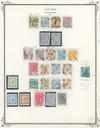
# MCC1076 - 1891-1984 Austria
Issue Dates: 1891-1984
Scott Catalogue Value: $2,191.65
Mystic Price: $1,665.00
You Save: $526.65
Large 72-page collection holds hundreds of mounted stamps. Mostly mint after 1948 and postally used before. Begins with a mint #63. Complete sets are plentiful. Most extensive before 1972. Includes three different blocks of four.
Austria is a beautiful central European country known for its lovely cities, excellent ski resorts, and gracious people. Located just north of Italy, Austria also borders Switzerland, Germany, Hungary, the Czech Republic, and Slovakia. The majestic Alps extend through Austria from west to east. In the eastern part of the country these mountains open into the Danube Valley, site of Vienna, the capital city.
One fourth of all Austrians live in Vienna. It is a city of trees and parks and narrow, curving streets. Vienna is known the world over for its music. It is the home of the famous Vienna Boys Choir, which has been in existence for almost 500 years. Mozart, Haydn, Schubert, and Mahler were all Austrian, and other musicians like Beethoven spent most of their lives in Austria.
Austria’s history is typical of many European nations. It has been inhabited since prehistoric times, originally settled by the Celts. Later it was invaded regularly, first by the Romans, then by Vandals, Goths, Huns and others. The Austro-Hungarian Empire lasted from 1867 until World War I destroyed it. The final invasion was Hitler in 1938. (The Rogers and Hammerstein hit musical “The Sound of Music” takes place in the Austrian alps during Hitler’s Anschluss.) Austria was liberated by the Allied Forces in 1945. Full independence was re-established in 1955. Today, Austria offers a beautiful cultural environment for citizens and visitors alike.
To survive in the modern world, Austria has developed strong industries. Large water-power plants produce enough electricity for all of Austria and for export to Italy and Switzerland. Important products include iron and steel, leather, wood, milk, butter, and cheese.
Issue Dates: 1891-1984
Scott Catalogue Value: $2,191.65
Mystic Price: $1,665.00
You Save: $526.65
Large 72-page collection holds hundreds of mounted stamps. Mostly mint after 1948 and postally used before. Begins with a mint #63. Complete sets are plentiful. Most extensive before 1972. Includes three different blocks of four.
Austria is a beautiful central European country known for its lovely cities, excellent ski resorts, and gracious people. Located just north of Italy, Austria also borders Switzerland, Germany, Hungary, the Czech Republic, and Slovakia. The majestic Alps extend through Austria from west to east. In the eastern part of the country these mountains open into the Danube Valley, site of Vienna, the capital city.
One fourth of all Austrians live in Vienna. It is a city of trees and parks and narrow, curving streets. Vienna is known the world over for its music. It is the home of the famous Vienna Boys Choir, which has been in existence for almost 500 years. Mozart, Haydn, Schubert, and Mahler were all Austrian, and other musicians like Beethoven spent most of their lives in Austria.
Austria’s history is typical of many European nations. It has been inhabited since prehistoric times, originally settled by the Celts. Later it was invaded regularly, first by the Romans, then by Vandals, Goths, Huns and others. The Austro-Hungarian Empire lasted from 1867 until World War I destroyed it. The final invasion was Hitler in 1938. (The Rogers and Hammerstein hit musical “The Sound of Music” takes place in the Austrian alps during Hitler’s Anschluss.) Austria was liberated by the Allied Forces in 1945. Full independence was re-established in 1955. Today, Austria offers a beautiful cultural environment for citizens and visitors alike.
To survive in the modern world, Austria has developed strong industries. Large water-power plants produce enough electricity for all of Austria and for export to Italy and Switzerland. Important products include iron and steel, leather, wood, milk, butter, and cheese.






